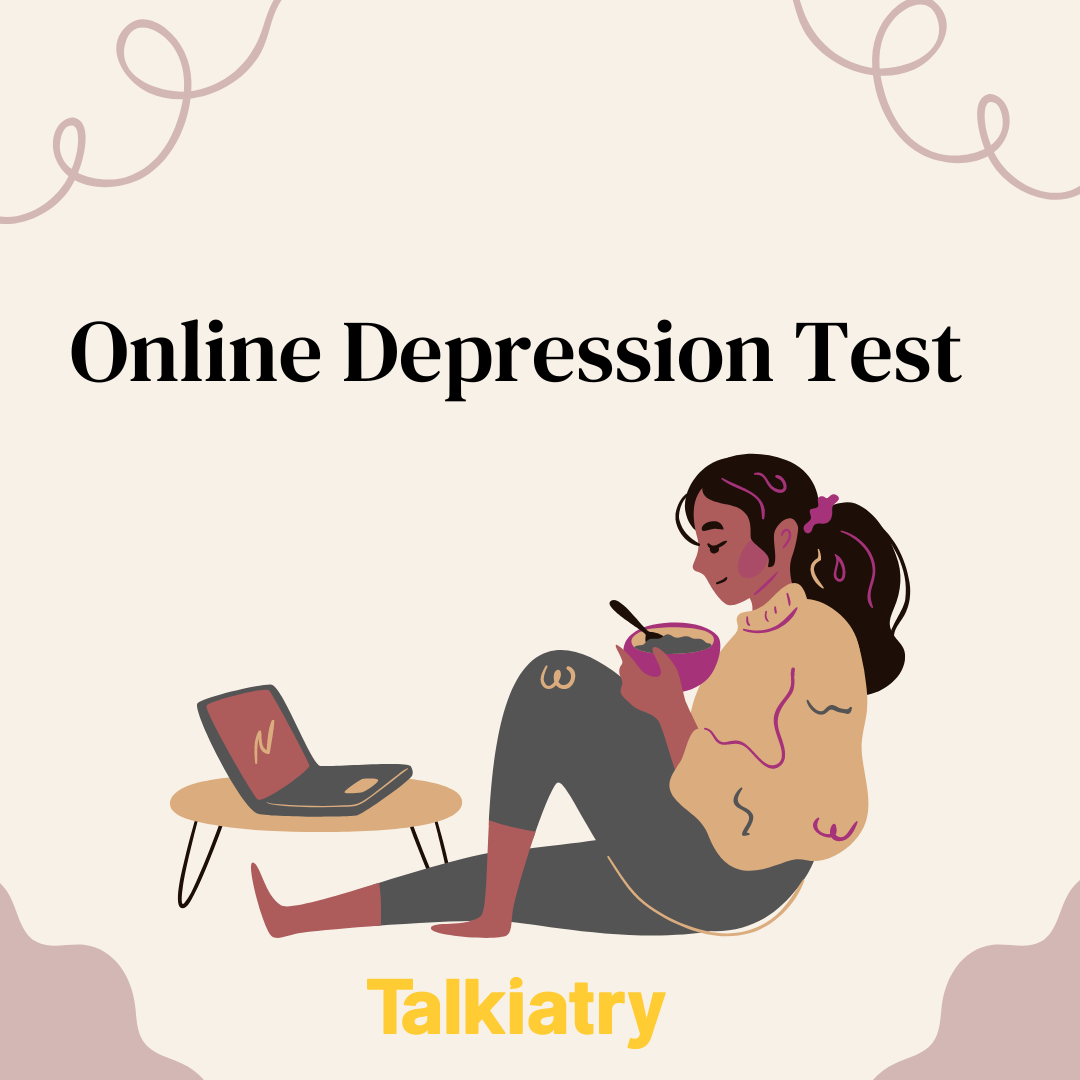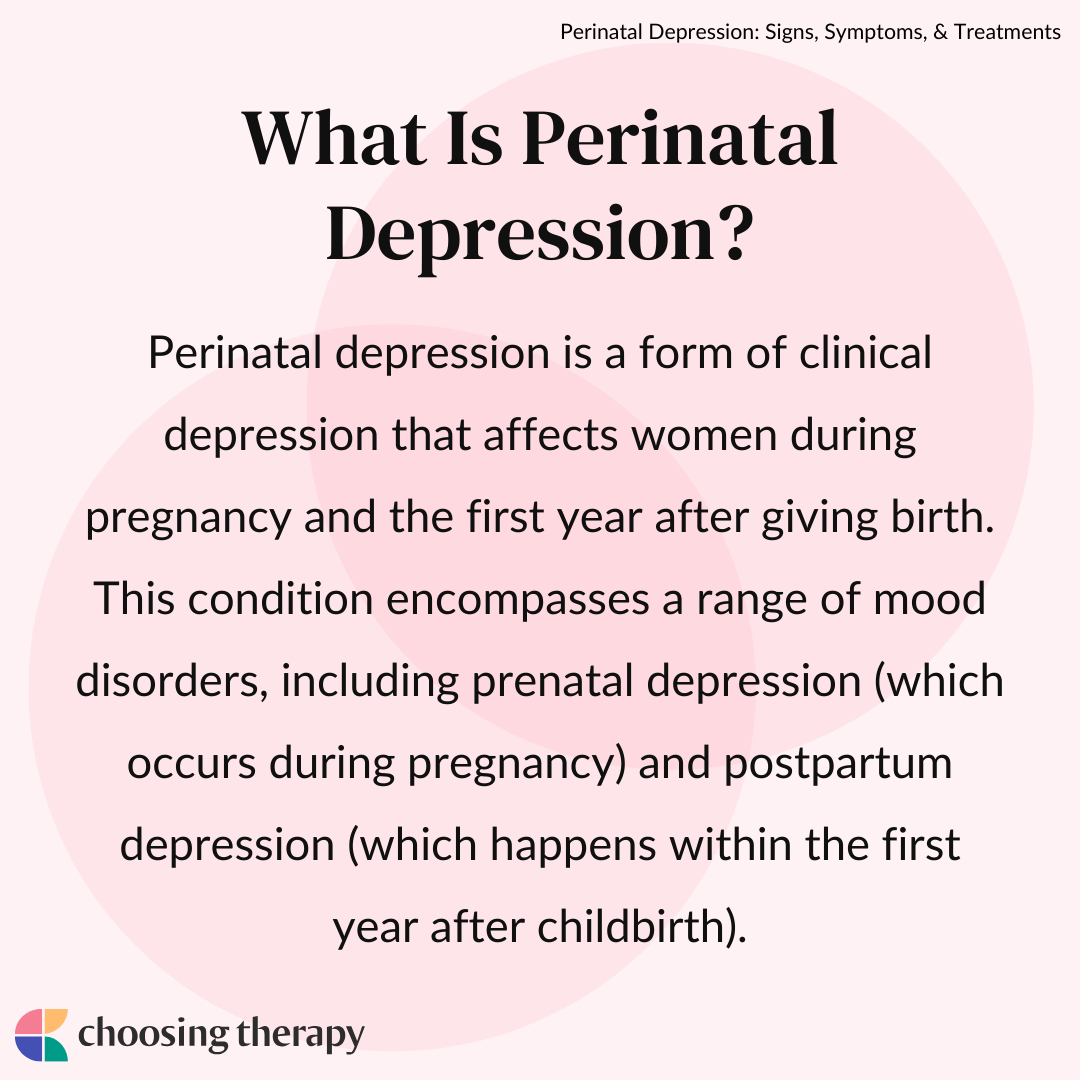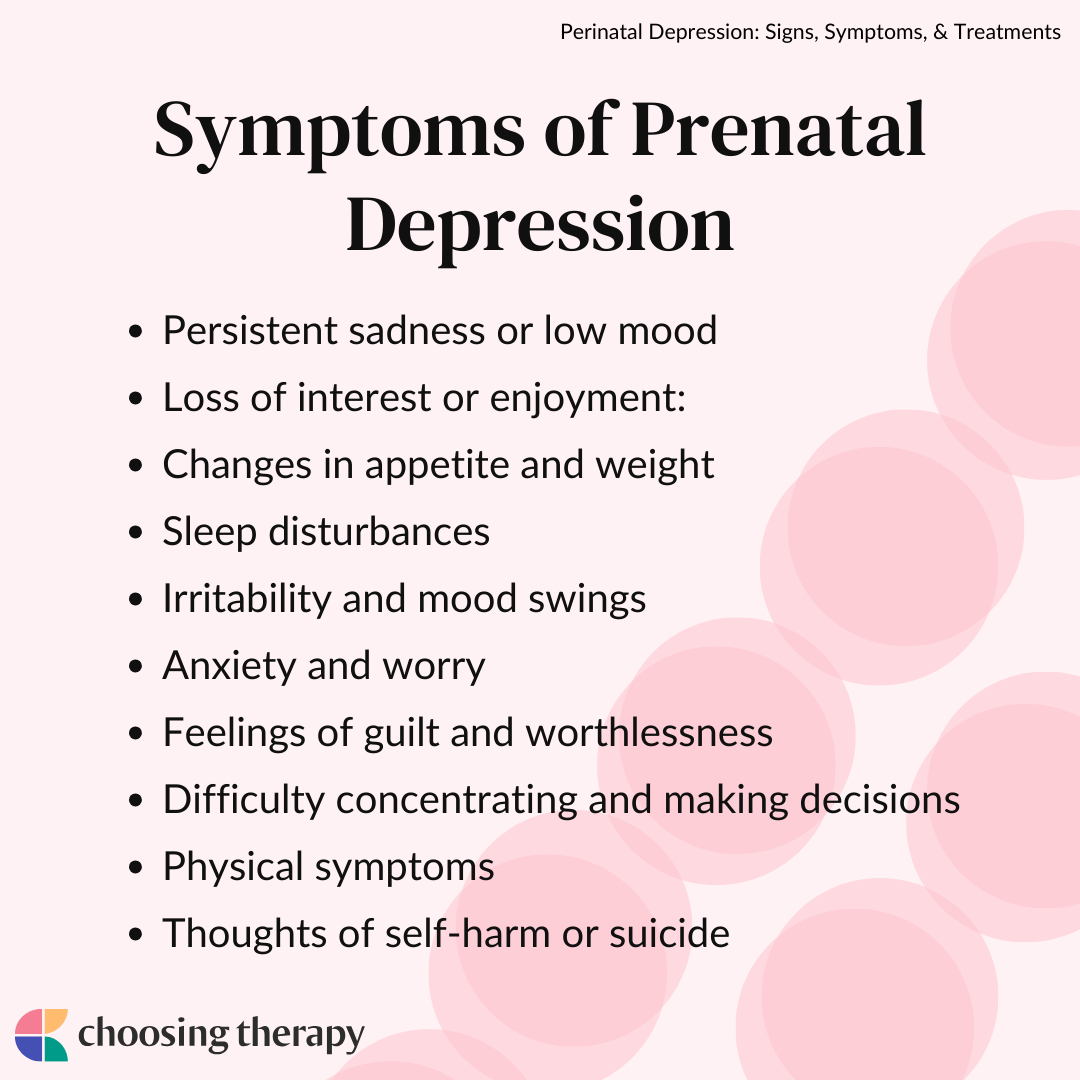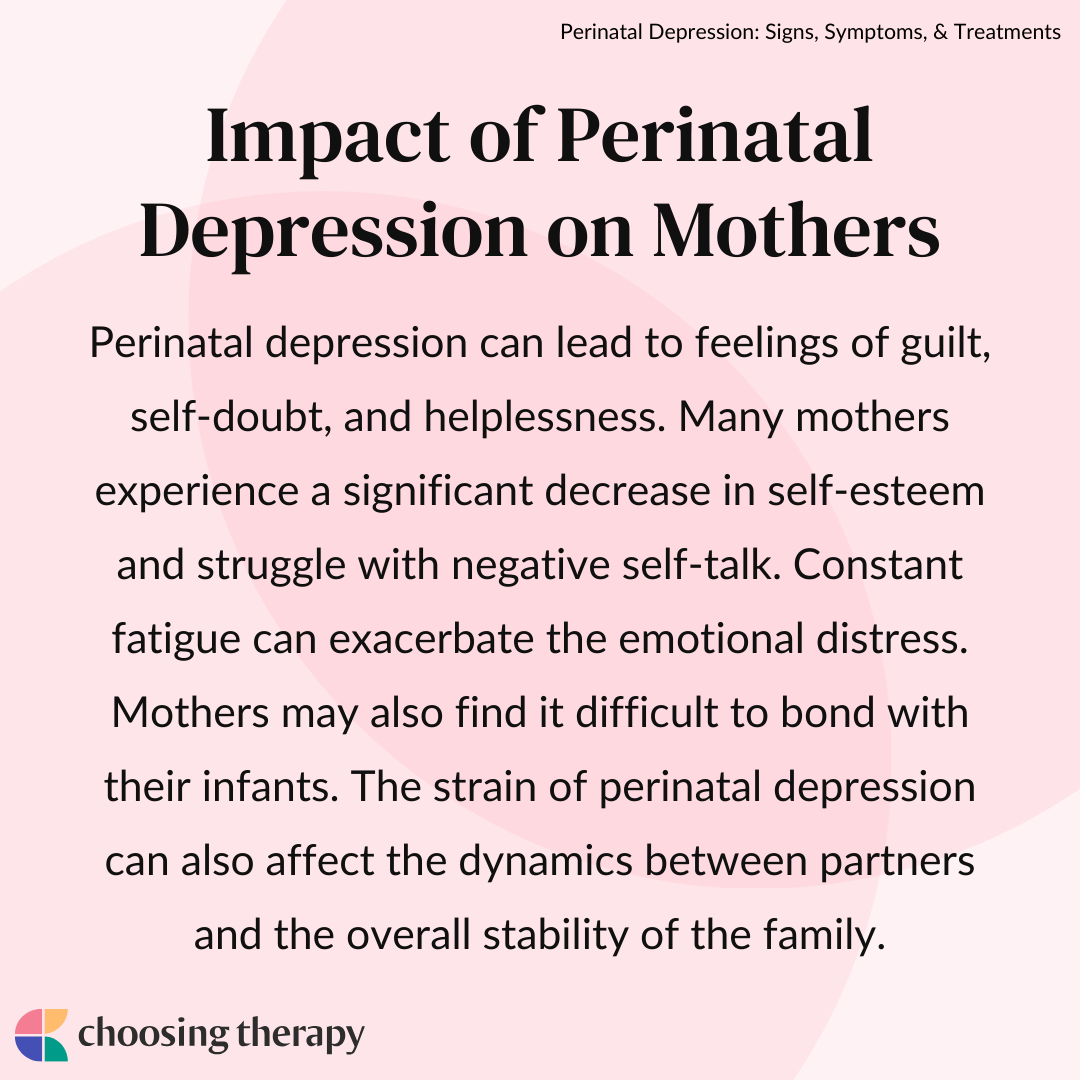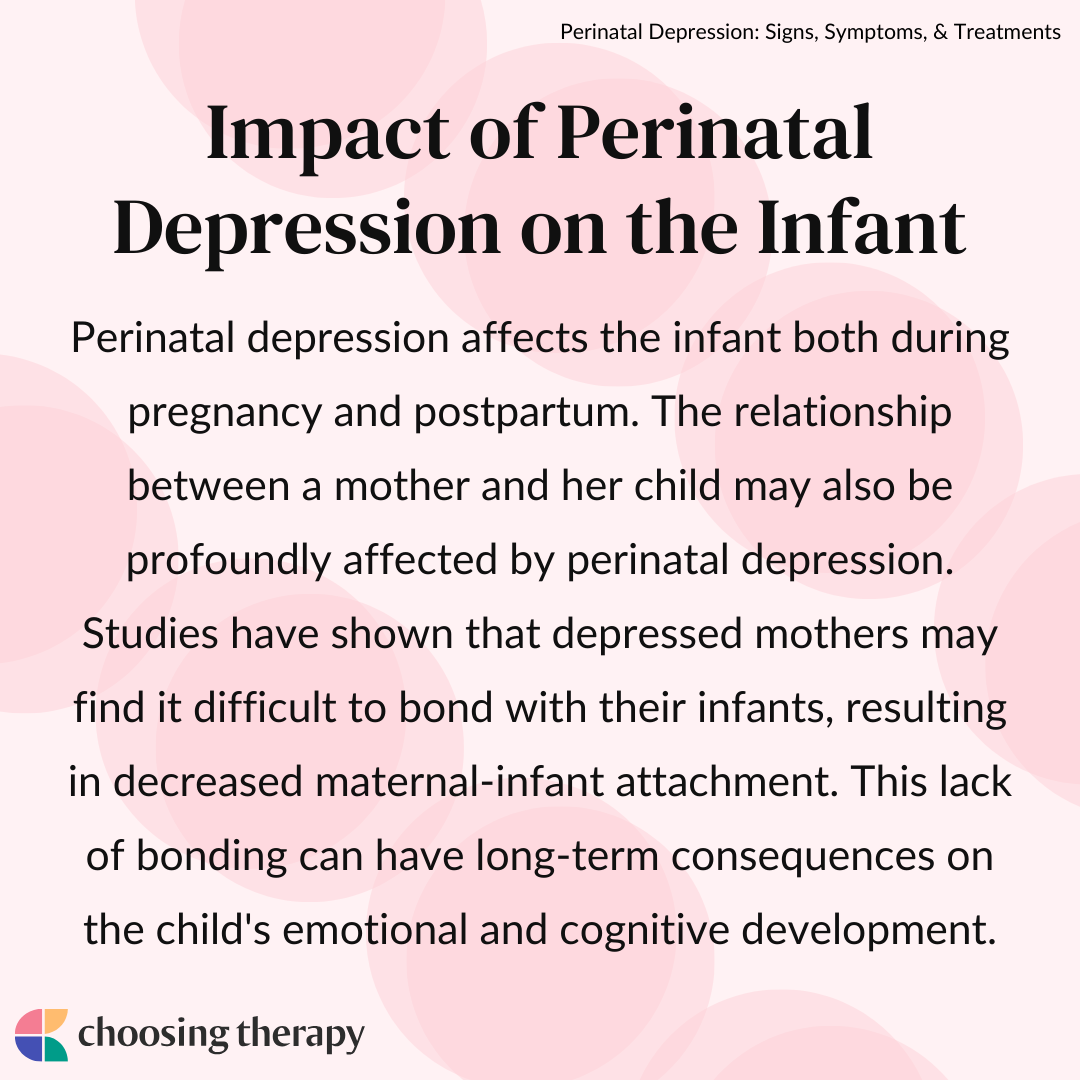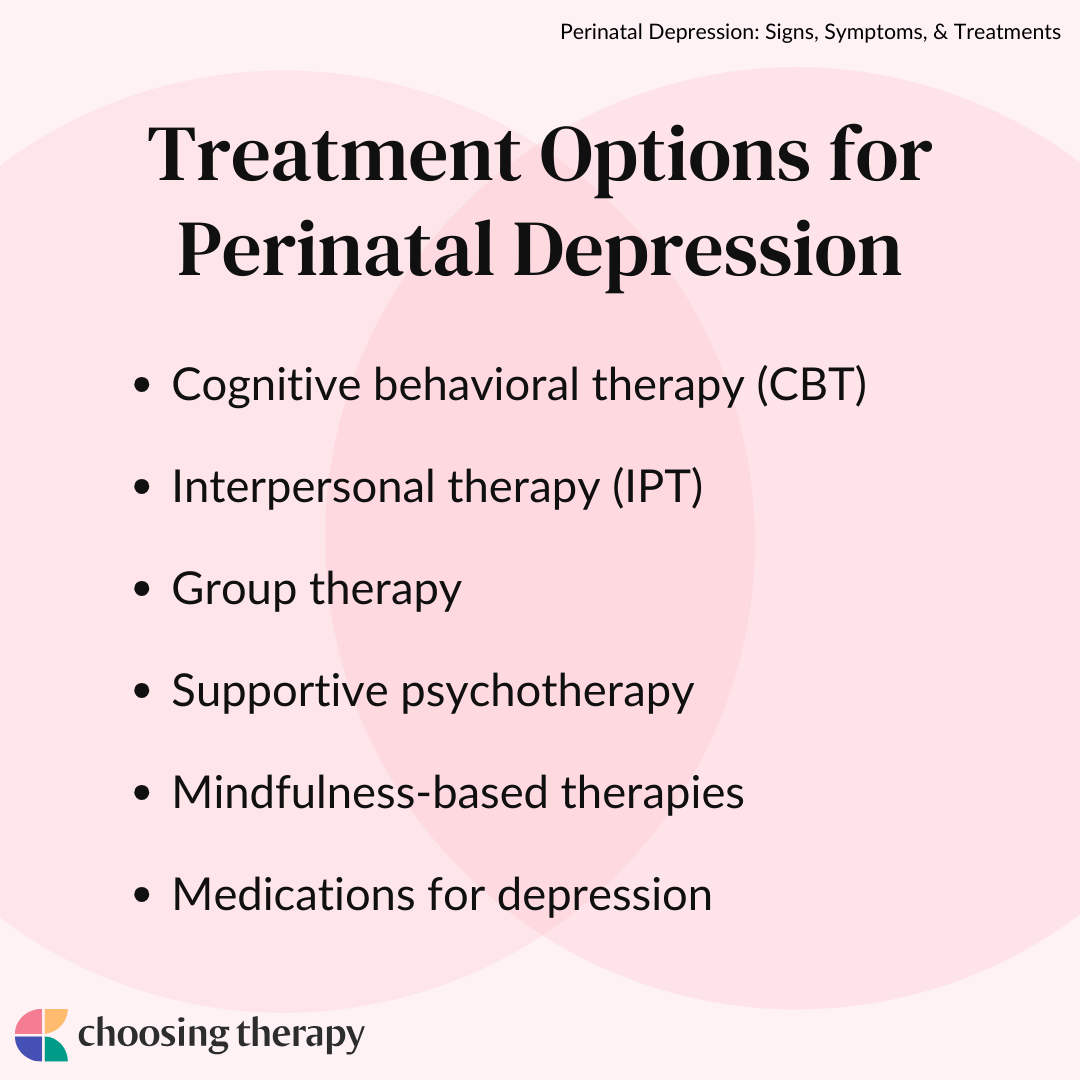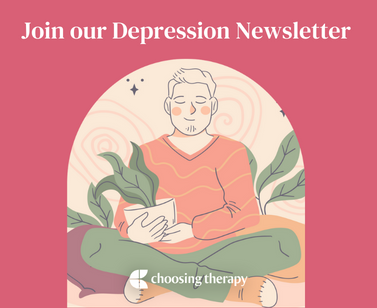Perinatal depression is a common mental health condition that affects women during pregnancy and after childbirth. Symptoms include persistent sadness, anxiety, and difficulty bonding with the baby. Treatment may include therapy, medication, or a combination of the two. Proper diagnosis and timely intervention are crucial to ensure the health of the mother as well as her child.
Depression Is Treatable With Therapy Would you like to feel more happiness and joy? BetterHelp has over 20,000 licensed therapists who provide convenient and affordable online therapy. BetterHelp starts at $65 per week. Take a Free Online Assessment and get matched with the right therapist for you.
What Is Perinatal Depression?
Perinatal depression is a form of clinical depression that affects women during pregnancy and the first year after giving birth. This condition encompasses a range of mood disorders, including prenatal depression (which occurs during pregnancy) and postpartum depression (which happens within the first year after childbirth).
The prevalence of postpartum depression is about 17%, while the incidence of prenatal depression is as high as 20 to 40%.1 Studies show that African American and Hispanic women have a higher odds ratio of reported postpartum depression due to a lack of social support, access, trust, and past depression.2 However, up to 85% of women experience some type of mood disturbance, often referred to as the “baby blues” during and after pregnancy.3
Perinatal Vs. Postpartum Depression
Historically, people used postpartum depression to describe depression that happened after childbirth. However, it didn’t take into consideration depression that occurred during pregnancy. Today, the term perinatal depression has expanded to include the entire perinatal period, which encompasses the period during pregnancy and the first year after childbirth. The terminology shift recognizes that depressive symptoms can occur during pregnancy, too.
Perinatal Depression Vs. Postpartum Psychosis
Postpartum psychosis is a distinct and severe mental health condition that is different from perinatal depression, although they are both related to the postpartum period. It usually occurs in the first few weeks after childbirth. It is considered a psychiatric emergency and requires immediate medical attention due to its potential for serious consequences.
Signs & Symptoms of Perinatal Depression
Since perinatal depression occurs during pregnancy or in the first year after childbirth, some women may experience a combination of these emotional, behavioral, and physical symptoms of prenatal and postpartum depression with varying severity. Postpartum depression symptoms often overlap with prenatal depression, although there are some distinct differences.
Symptoms of prenatal depression include:
- Persistent sadness or low mood: Feeling down, tearful, and emotionally overwhelmed for extended periods is a common sign of prenatal depression. This sadness may be accompanied by a sense of hopelessness and a feeling that nothing will get better.
- Loss of interest or enjoyment: Women with prenatal depression may lose interest in activities they previously enjoyed. Hobbies, socializing, and even preparing for the baby’s arrival might seem overwhelming and joyless.
- Changes in appetite and weight: Pregnant women with prenatal depression may experience significant changes in appetite. They may have a decreased or increased appetite, which can result in noticeable weight loss or gain.
- Sleep disturbances: Insomnia, difficulty falling asleep, or disrupted sleep patterns are often observed in women with prenatal depression. Fatigue and low energy levels may persist throughout the day, making it difficult to carry out daily tasks.
- Irritability and mood swings: Hormonal changes during pregnancy can cause mood swings, but intense irritability and frequent mood changes that interfere with daily life may indicate prenatal depression.
- Anxiety and worry: Women with prenatal depression often experience excessive anxiety and worry about the health and well-being of their unborn baby. This may be accompanied by intrusive thoughts.
- Feelings of guilt and worthlessness: Many women with prenatal depression experience intense feelings of mom guilt, worthlessness, or thoughts that they are failing as a mother or partner.
- Difficulty concentrating and making decisions: Pregnancy already requires a lot of mental and emotional energy. Prenatal depression can further impair concentration and make decision-making exceptionally challenging.
- Physical symptoms: Alongside emotional and psychological symptoms, women may also experience physical symptoms such as headaches, stomachaches, and even shortness of breath.
- Thoughts of self-harm or suicide: In severe cases, women may have thoughts of self-harm or suicide. Any mention of self-harm must be taken seriously, and if any warning signs of suicide exist, immediate help should be sought.
Symptoms of postpartum depression include:
- Persistent sadness and low mood that lasts most of the day, nearly every day
- Loss of interest or pleasure in once enjoyable activities
- Changes in appetite and weight
- Sleep disturbances
- Fatigue or loss of energy
- Difficulty concentrating, remembering things, and decision-making
- Feelings of intense guilt, self-blame, or worthlessness
- Anxiety or irritability
- Withdrawal from family and friends
- Difficulty or lack of interest in bonding with the baby
- Suicidal or self-harm thoughts
Help For Depression BetterHelp – Get help from a licensed therapist. BetterHelp offers convenient and affordable online therapy starting at $65 per week. Free Assessment Talkspace – Online Therapy With Or Without Insurance. Talkspace accepts many insurance plans including Optum, Cigna, and Aetna. Typical co-pay is $30, but often less. Get started
When to Call Your Doctor About Perinatal Depression
Pregnancy involves various hormonal and emotional changes that can lead to mood fluctuations. However, if symptoms persist, interfere, overtake daily life, or cause significant distress, seek help immediately from a healthcare professional. Perinatal depression is not a sign of weakness; it’s simply a medical condition that requires attention and treatment. Seeking professional help is essential for both you and your child’s well-being.
If You Have Suicidal Thoughts
Perinatal depression, particularly when it leads to persistent suicidal thoughts or harming yourself or your baby, requires immediate emergency help. Call 988, a national suicide and crisis lifeline that provides 24/7, free and confidential support. You’ll be routed to a local 988 Lifeline network crisis center, where a skilled, trained crisis worker will listen to you, provide support, and get you the help you need.
You may be referred to a mental health specialist such as a psychiatrist, psychologist, or licensed therapist. While persistent suicidal thoughts can be extremely frightening, they can be managed with the right support and intervention.
Diagnosis of Perinatal Depression
Early detection of perinatal depression helps promote the well-being of both mothers and their infants. As of 2019, the U.S. Prevention Services Task Force (USPSTF) recommends that clinicians refer pregnant and postpartum women at increased risk of perinatal depression to counseling interventions.4
By recognizing the signs of perinatal depression and seeking professional help, women can take proactive steps toward managing perinatal depression effectively. While screening tools are helpful in identifying perinatal depression, they should not be used as standalone diagnostic tools. Positive screening results should be followed by further evaluation by a healthcare professional to determine the diagnosis and develop a suitable treatment plan.
Impact of Perinatal Depression on the Mother
Perinatal depression can lead to feelings of guilt, self-doubt, and helplessness. Many mothers experience a significant decrease in self-esteem and struggle with negative self-talk. Constant fatigue can exacerbate the emotional distress. Mothers may also find it difficult to bond with their infants. The strain of perinatal depression can also affect the dynamics between partners and the overall stability of the family.
Impact of Perinatal Depression on the Infant
Perinatal depression affects the infant both during pregnancy and postpartum. The relationship between a mother and her child may also be profoundly affected by perinatal depression. Studies have shown that depressed mothers may find it difficult to bond with their infants, resulting in decreased maternal-infant attachment. This lack of bonding can have long-term consequences on the child’s emotional and cognitive development.
Perinatal depression can impact the mother’s ability to provide consistent care and responsiveness, which are crucial for healthy child development. Children who experience disruptions in early bonding may be at an increased risk of developmental delays, behavioral problems, and difficulties in forming positive relationships as they grow older.
Impact of Perinatal Depression on the Partner & Family
Perinatal depression is not limited to the affected mother. It can significantly impact the dynamics of relationships and family life. Partners may struggle to understand the changes in mood and behavior, causing tension and potentially affecting the overall stability of the relationship. The emotional and physical toll of depression may lead to increased stress, communication difficulties, and relationship burnout.
The dynamics with extended family members, such as grandparents or siblings, can be affected. Family members may find it challenging to provide support or understand the changes occurring, leading to strained relationships. The compromised overall family support system makes it even more difficult for the mother to cope with perinatal depression.
Depression Is Treatable With Therapy Would you like to feel more happiness and joy? BetterHelp has over 20,000 licensed therapists who provide convenient and affordable online therapy. BetterHelp starts at $65 per week. Take a Free Online Assessment and get matched with the right therapist for you.
Treatment Options for Perinatal Depression
To ensure the well-being of both the mother and child, treatment is available to help alleviate symptoms and support women during perinatal depression. Treating perinatal depression requires a comprehensive approach that may include a combination of these strategies. Treatment plans should be individualized based on the severity of symptoms, preferences, and consultation with a healthcare provider.
Treatment options for perinatal depression include:
Therapy
As perinatal depression can significantly negatively impact a woman’s mental health and overall well-being, therapy can help. Therapy can play a crucial role in managing perinatal anxiety by providing support, coping strategies, and a safe space for women to express their thoughts and emotions.
Effective therapy techniques commonly used for perinatal depression include:
- Cognitive behavioral therapy (CBT): CBT for depression can help with perinatal depression as it offers a ray of hope. By addressing negative thought patterns, teaching coping skills, and promoting healthier behaviors, CBT provides women with tools to overcome perinatal depression.
- Interpersonal therapy (IPT): IPT can help with perinatal depression as it offers a structured and effective approach to addressing interpersonal challenges faced during the perinatal period.
- Group therapy: By creating a supportive network, offering perspective and coping skills, validating experiences, and promoting ongoing support, through group therapy, women can find solace and healing in their journey toward recovery. Online group therapy has emerged as a promising and effective approach for treating perinatal depression. Its numerous advantages include convenience, accessibility, anonymity, and social support.
- Supportive psychotherapy: Connecting with others who are experiencing or have experienced perinatal depression can be incredibly beneficial and reduce feelings of isolation.
- Mindfulness-based therapies: Mindfulness-based therapies, such as mindfulness-based CBT or mindfulness-based stress reduction, have been found to be effective in reducing depressive symptoms and improving overall well-being in women with perinatal depression. These therapies involve meditation for depression, breathing exercises, and body awareness.
Medication
Medications can be an important part of managing perinatal depression during pregnancy and postpartum, but careful consideration of safety and effectiveness is necessary.
Medication options for perinatal depression include:
- Selective serotonin reuptake inhibitors (SSRIs): SSRIs are a class of antidepressants that includes medications such as sertraline (Zoloft), fluoxetine (Prozac), and escitalopram (Lexapro). SSRIs work by increasing the levels of serotonin in the brain, which can help stabilize mood and alleviate depressive symptoms.
- Serotonin-norepinephrine reuptake inhibitors (SNRIs): Medications such as venlafaxine (Effexor) and duloxetine (Cymbalta) are examples of SNRIs. SNRIs are generally considered safe during pregnancy and breastfeeding.
- Atypical antidepressants: Bupropion (Wellbutrin) is one example of an atypical antidepressant that may be used to treat perinatal depression. Bupropion primarily affects the neurotransmitters dopamine and norepinephrine.
- Tricyclic antidepressants (TCAs): TCAs are an older class of antidepressants that are sometimes used to treat perinatal depression when SSRIs and SNRIs have been ineffective or not well-tolerated. TCAs include amitriptyline (Elavil) and nortriptyline (Pamelor).
- Antianxiety medications: In some cases, women with perinatal depression may also experience severe anxiety or panic attacks. For these women, they may be prescribed antianxiety medications such as benzodiazepines, like lorazepam (Ativan).
Alternative Treatments
While traditional treatment options such as therapy and medication are often effective, there are also alternative treatments that can provide relief and support during perinatal depression.
Alternative treatments for perinatal depression include:
- Acupuncture: Acupuncture is believed to rebalance the body’s energy flow, promoting overall well-being, and can be beneficial in managing depression and anxiety, including prenatal depression.
- Dietary adjustments: While dietary adjustments alone may not be sufficient to overcome prenatal depression, optimizing nutrition through dietary adjustments can undoubtedly contribute to improved mental well-being during pregnancy and reduce the risk of prenatal depression.
- Massage therapy: Massage therapy involves manipulating the body’s soft tissues to improve circulation, reduce muscle tension, and release endorphins – the body’s natural painkillers and mood enhancers. Regular massage sessions can help reduce symptoms of depression and provide a sense of physical and emotional comfort during the postpartum period.
- Exercise: Activities such as walking, yoga, or low-impact workouts tailored for people with perinatal depression can be beneficial as exercise improves depressive symptoms by releasing endorphins, improving sleep, and boosting overall mood. Women who are further along in their pregnancy or have recently given birth should consult with their doctor before beginning a movement routine.
- Herbal supplements: People often explore the use of herbal supplements to alleviate symptoms of perinatal depression. St. John’s Wort, a plant-based supplement, is commonly used for mild to moderate depression.
Depression Is Treatable With Therapy Would you like to feel more happiness and joy? BetterHelp has over 20,000 licensed therapists who provide convenient and affordable online therapy. BetterHelp starts at $65 per week. Take a Free Online Assessment and get matched with the right therapist for you.
How to Cope with Perinatal Depression
Coping with perinatal depression requires a comprehensive approach that addresses both the practical and emotional aspects of well-being. Self-care is of utmost importance as mothers manage the responsibilities of motherhood and conquer perinatal depression.
Here are eight tips for how to cope with perinatal depression:
- Stress-reduction techniques: Engaging in stress-reducing activities such as practicing mindfulness, participating in creative hobbies, or seeking relaxation techniques can help alleviate stress while experiencing perinatal depression.
- Physical self-care: Engaging in regular exercise, eating nutritious meals, and getting adequate sleep can have a positive impact on both physical and mental well-being while managing perinatal depression. Exercise releases endorphins that promote feelings of happiness and reduce symptoms of depression.
- Rest and sleep management: New mothers often experience disturbed sleep due to the demands of caring for a newborn, hormonal changes, and physical discomfort. Sleep deprivation can exacerbate the symptoms of perinatal depression.
- Emotional self-care: Emotional self-care practices such as getting a makeover, dressing up, or engaging in activities that bring joy and satisfaction can help women feel more confident and positive about themselves, thereby improving their self-esteem.
- Emotional support: Perinatal depression can make women feel emotionally drained and disconnected. Engaging in self-care activities such as meditation, journaling, or taking relaxing baths can help alleviate feelings of stress and improve emotional well-being. These practices allow women to reconnect with themselves and find solace in moments of quiet reflection.
- Support groups: Sharing experiences with support groups can create a sense of belonging and reduce feelings of isolation.
- Partner and family support: Partners and families can participate in therapy sessions to develop effective communication strategies and improve the overall relationship dynamics.
- Self-care: Dedicate time to engage in self-care activities for postpartum or peripartum depression that are enjoyable or relaxing, like taking walks, practicing mindfulness for depression, reading, engaging in hobbies, or pampering yourself.
Breaking the Stigma of Perinatal Depression
Stigmas surrounding perinatal depression can discourage women from seeking help and hinder their recovery process. By debunking myths and promoting an environment of empathy and support, we can ensure that women experiencing perinatal depression receive the care they need as they navigate this challenging period in their lives.
How to Prevent Perinatal Depression From Getting Worse
One of the most crucial preventive strategies for ensuring that a woman’s perinatal depression doesn’t worsen is prenatal psychoeducation and awareness. Healthcare providers should provide comprehensive information about perinatal depression, its symptoms, and potential risk factors to all expectant mothers. This awareness allows women to recognize the signs early and seek help promptly, reducing the overall impact of perinatal depression.
How to Find Professional Support for Perinatal Depression
Perinatal depression is much more than temporary mood swings that come with hormonal changes during pregnancy. It is a serious mental health condition that requires professional intervention to ensure the best possible outcomes for mother and child. Professional support is crucial for accurate diagnosis, customized treatment plans, emotional well-being, improved bonding with the child, prevention of long-term mental health issues, and support for the entire family.
There are resources and healthcare professionals who can provide support. You may want to consider an online therapist directory or online therapy platform. And when it comes to depression medication management, consider online psychiatrist options.
In My Experience
To help our readers take the next step in their mental health journey, Choosing Therapy has partnered with leaders in mental health and wellness. Choosing Therapy is compensated for marketing by the companies included below. Talk Therapy Online-Therapy.com – Get support and guidance from a licensed therapist. Online-Therapy.com provides 45 minute weekly video sessions and unlimited text messaging with your therapist for only $64/week. Get Started Online Psychiatry Hims / Hers If you’re living with anxiety or depression, finding the right medication match may make all the difference. Connect with a licensed healthcare provider in just 12 – 48 hours. Explore FDA-approved treatment options and get free shipping, if prescribed. No insurance required. Get Started Depression Newsletter A free newsletter from Choosing Therapy for those impacted by depression. Get helpful tips and the latest information. Sign Up Learn Anti-Stress & Relaxation Techniques Mindfulness.com – Change your life by practicing mindfulness. In a few minutes a day, you can start developing mindfulness and meditation skills. Free Trial Choosing Therapy Directory You can search for therapists by specialty, experience, insurance, or price, and location. Find a therapist today.Additional Resources
Online Depression Test A few questions from Talkiatry can help you understand your symptoms and give you a recommendation for what to do next. Best Online Psychiatry Services Online psychiatry, sometimes called telepsychiatry, platforms offer medication management by phone, video, or secure messaging for a variety of mental health conditions. In some cases, online psychiatry may be more affordable than seeing an in-person provider. Mental health treatment has expanded to include many online psychiatry and therapy services. With so many choices, it can feel overwhelming to find the one that is right for you.